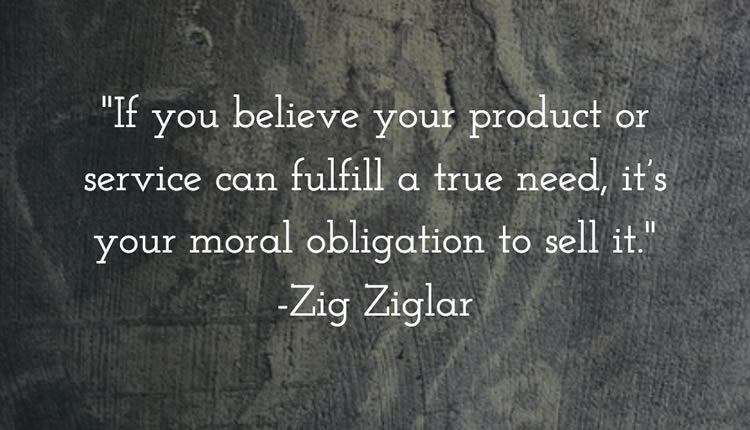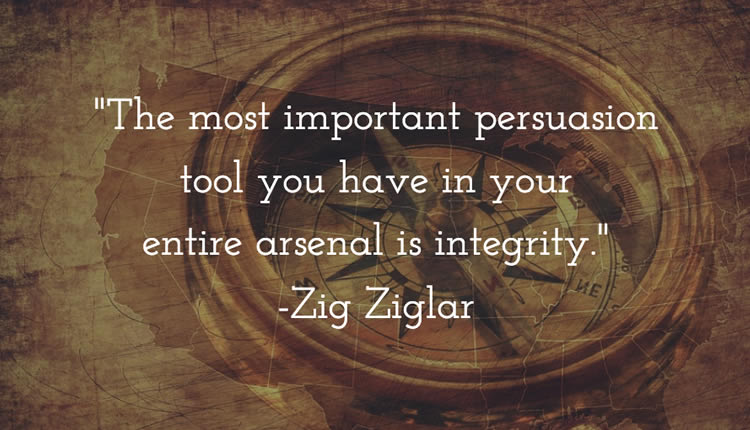Believing in Your Product Makes You More Persuasive
Self-deception is increased by financial motivation, too.

It’s a sales maxim that believing in the value of your product or service is essential. Logic dictates you should believe in what you sell. If you didn’t, sales would become a process of unethical manipulation in which you convinced customers to make decisions they would regret later.
Zig Ziglar, the most famous salesperson and sales trainer of all time, took confidence in your product a step farther when he said,
If you believe your product or service can fulfill a true need, it’s your moral obligation to sell it.

Believe in your product? Zig Ziglar said it's your 'moral obligation' to sell it! #sales #Neuromarketing Click To Tweet
Study Shows Belief Works
It turns out there’s solid science behind the importance of believing in your product. A new study confirms that we are more persuasive when we believe in what we are selling. There’s a darker side to that research, though. The same study also shows that we deceive ourselves when we are financially motivated to be persuasive.
The experiment had subjects write a persuasive speech about a fictional male character. Two groups of subjects were asked to make the speech portray the character as likable or unlikable. A third group received no specific direction and could portray him based on their own impressions. All subjects were told they would receive a bonus based on the speech’s effectiveness.
All subjects were shown the same set of short videos that included favorable and unfavorable examples of the character’s behavior. So, there was evidence to support both positions. The subjects could choose to stop watching the videos at any point in the process.
The researchers threw in a twist, though. They showed different groups of subjects the videos in a different order. Some saw mostly favorable videos first, and others saw mostly unfavorable videos to begin with.
Incentives changed viewing behavior
The behavior of the subjects was interesting. Those incentivized to support one view of the character stopped watching the videos earlier when the first videos mostly supported their position. They watched more videos if the videos they saw first didn’t agree with the position they were told to support.
The subjects did write more effective speeches when they expected a bonus for supporting a particular view of the character, according to the study. Those who saw videos mostly supporting their position first apparently stopped watching when they felt they had enough helpful evidence. They avoided watching more content that might have made supporting their conclusion more difficult.
The scientists considered this to be self-deception. In Scientific American, one of the scientists, William von Hippel of the University of Queensland, said:
Money rewards increase self-deception. That, in turn, boosts ability to persuade others. #sales #Neuromarketing Click To TweetWhat’s so interesting is that we seem to intuitively understand that if we can get ourselves to believe something first, we’ll be more effective at getting others to believe it. So we process information in a biased fashion, we convince ourselves, and we convince others.
Self-Deception vs. Honest Belief
No doubt this ability to deceive oneself explains how some salespeople seem to be both untroubled and even successful when they sell bad products. They ignore evidence that the product doesn’t work well and seek out evidence that shows it does.
As they internalize the belief, confirmation bias kicks in to make it stronger. Evidence that doesn’t support the positive view is dismissed as biased or tainted. A desire for consistency can further strengthen the belief. If you believe you are a good person, and you have been selling a product for years, then it must be good. To think of the product as bad would create the unpleasant condition known as cognitive dissonance.
How can we use this knowledge in an ethical way? First, we have to recognize that financial incentives foster self-deception. Salespeople who are honest in most ways may not provide unbiased product information to customers.
Here’s an example of self-deception in sales: Multiple times I’ve had people selling financial products assure me that their sales commission (as high as 6%) was no big deal and would be more than compensated by the returns I’d receive eventually. (They never mentioned that fee, of course, one had to find it in the fine print.) In fact, research generally shows that sales fees and administrative expenses are a major determinant of long-term returns when comparing similar financial products.
I don’t think these salespeople were evil, but I do think they deceived themselves about the impact of an up-front 6% reduction in principal on the long-term value of an investment. Like the subjects in the study, they could find evidence to support their position – other firms do it too, it’s always been that way, our above-average returns will offset the cost, and so on. And, like the subjects, they could choose to tune out information that didn’t support their argument.
Whether we are a customer, a sales manager, or the salesperson, we need to recognize the bias inherent in most sales situations and ensure that it doesn’t affect our decision process.
Here’s the positive side of the study results… Any sales organization can use this strategy in an ethical way. Give your people information that helps them believe in the product – reviews, comparisons, customer success stories, and so on.
Don’t be afraid to point out a shortcoming or two – including a small amount of negative information has been shown to make an argument more persuasive.
If your salespeople believe in your product or service, they will be more persuasive. Just ensure that these beliefs are based on true and accurate information. As Zig Ziglar also said,
The most important persuasion tool you have in your entire arsenal is integrity.
Zig Ziglar said integrity is your most important #persuasion tool. #sales #Neuromarketing Click To Tweet


Hey Roger,
there can be no argument here. Long-term sabotage is virtually assured if you have no belief in the product. Even stronger than belief is “knowing.”
Gary
Interesting. I always believed this was true, but never really looked into it. I’d never considered self-deception either when it comes scams, either, but it makes a lot of sense.
That’s the dream though, isn’t it? Coming up with an idea that you genuinely believe will change the world (or something like that) and then giving your everything trying to see it realized?
So important to recognize where our persuasive power comes from and maintain integrity while we persuade. Your point about giving people information that helps them believe in the product sounds like a good case for gathering relevant, true, informative stories from within the business itself and from its customers.